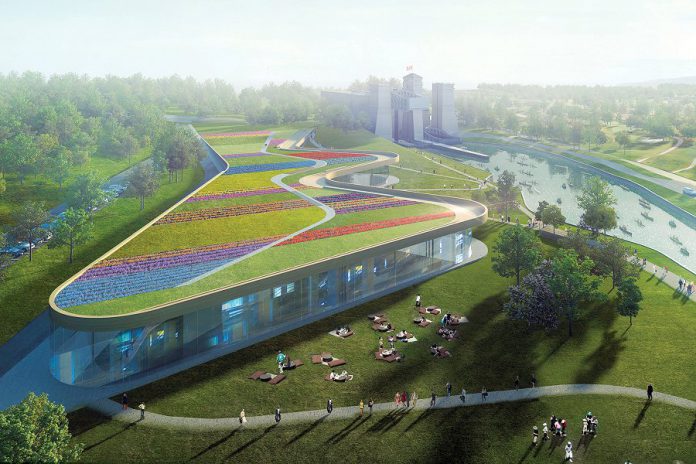
In a major setback for the Canadian Canoe Museum, the planned new museum is no longer going to be located beside the Peterborough Lift Lock due to the presence of a cancer-causing chemical at the planned site for the facility.
The museum announced on Wednesday (October 28) that it has has terminated its lease agreement with Parks Canada for the land located alongside the Peterborough Lift Lock on the Trent-Severn Waterway at 353 Hunter Street East.
In May, an independent investigation by the museum determined the site, owned by Parks Canada, contains the chemical compound trichloroethylene (TCE), along with a variety of other chemicals.
A clear non-flammable liquid with a sweet smell, TCE was commonly used as an industrial solvent in the past. It is classified as a human carcinogen and a non-carcinogenic health hazard. Groundwater and drinking water contamination from industrial discharge of trichloroethylene is a major concern for human health and has resulted in numerous public health incidents and lawsuits in the U.S.
The museum states that this discovery, “together with the costs associated with clearing the contamination, the resulting unavoidable project delays, and inevitable rising costs have rendered the site no longer viable for the new museum build.”
Carolyn Hyslop, the museum’s executive director, states in a media release the museum and Parks Canada reached an “amicable dissolution” of the lease agreement “at no additional punitive cost to the museum.”
The museum is now looking at alternative sites in Peterborough where the new museum can be located, and will conduct feasibility studies and environmental assessments before selecting a new site.
“We are in the process of identifying and selecting a new site for what will be a revised museum design that will complement the waterfront site selection,” Hyslop says. “The museum remains dedicated to building a home that will permit us to share 100 per cent of our collection in a facility that meets conservation standards, to creating a new suite of exhibitions, and to increasing opportunities for in-person, digital and on-water programming.”
With the Peterborough Lift Lock site no longer an option, the original architectural designs for the new facility — which were designed around the Lift Lock site — are now obsolete.
“We had a beautiful, award-winning design that was perfectly suited for the Lift Lock location that is regretfully utterly non-transferable to another location,” Hyslop says. “Recognizing the deep attachment and disappointment shared by all involved in the face of current circumstances, the museum looks forward to announcing the selection of a new site in Peterborough that will help us advance this important project by the end of the year.”
Despite this major setback, the museum states “the project is expected to be shovel-ready by the end of 2021.”
The ground water at 353 Hunter Street East, owned by Parks Canada, is believed to have been contaminated by chemicals seeping from an adjacent property. Two factories were located in the area.
Westclox (formerly The Western Clock Company) operated a clock-making factory on Hunter Street, on the hill overlooking the Trent Canal, from 1922 until the early 1980s. The building, which has since been converted into condos and offices, is now called Time Square and is operated by the Skyline Group of Companies. It is unknown whether industrial solvents were used in the manufacture and assembly of clocks.
Fisher Gauge operated a metal die-casting plant at 194 Sophia Street near the Trent Canal. The company, which later became FisherCast Global, was acquired by DynaCast in 2008 and currently operates a factory on Neal Drive. Industrial solvents such as TCE are used for both cleaning and finishing metals.


























